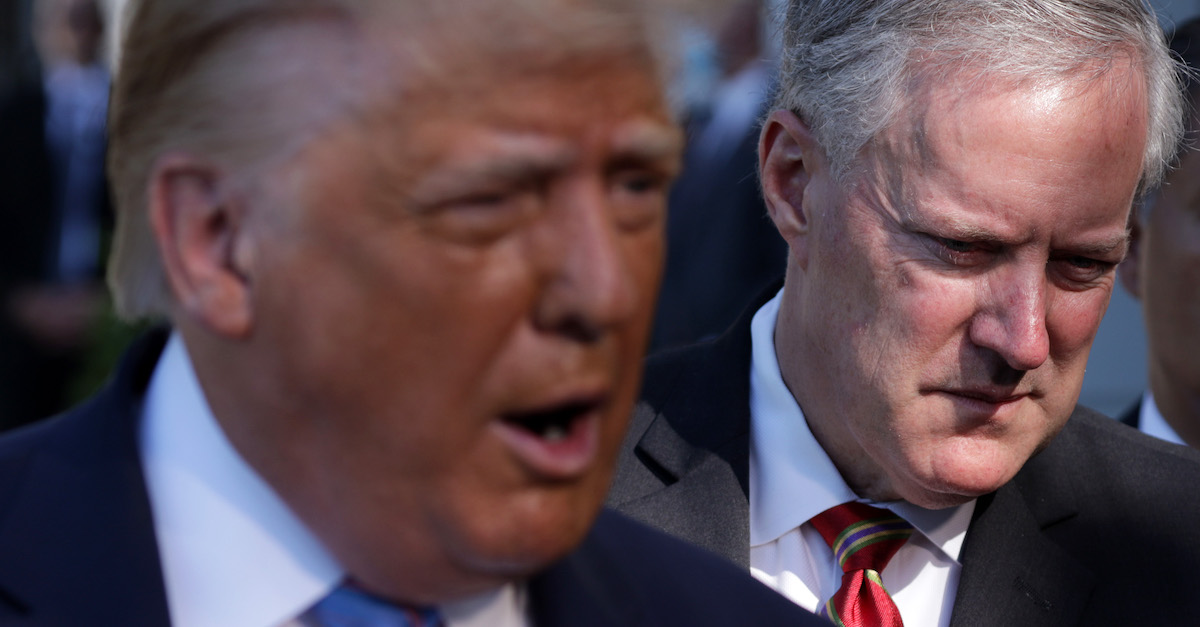
Donald Trump speaks as then-White House Chief of Staff Mark Meadows listens from the South Lawn of the White House July 29, 2020. (Alex Wong/Getty Images)
No active judge on the U.S. Court of Appeals for the 11th Circuit was interested in sitting en banc to rehear Mark Meadows’ case for moving his Georgia RICO case to federal court, the court said Wednesday in a brief denial.
“The Petition for Rehearing En Banc is DENIED, no judge in regular active service on the Court having requested that the Court be polled on rehearing en banc,” the 11th Circuit said in a per curiam order. “The Petition for Rehearing En Banc is also treated as a Petition for Rehearing before the panel and is DENIED.”
The 11th Circuit’s rules memo (see: page 151) explains that the court had 30 days after receiving Meadows’ petition for a rehearing by all of the judges on the court to either grant a rehearing by the original panel or request a poll of the judges on whether to take up the case en banc. Any of the circuit judges could have requested a poll of colleagues to vote on taking up the petition, but none of them did.
“If after expiration of the specified time for requesting a poll, the notify judge has not received a poll request from any active member of the court, the panel, without further notice, may take such action as it deems appropriate on the petition for rehearing en banc,” the rules note. “In its order disposing of the appeal or other matter and the petition, the panel must note that no poll was requested by any judge of the court in regular active service.”
That’s what happened here.
As Law&Crime reported on mid-December oral arguments, the former White House chief of staff to then-President Donald Trump was met with a chilly reception from a three-judge panel of Chief U.S. Circuit Judge William Pryor, a George W. Bush appointee, U.S. Circuit Judge Robin Rosenbaum, a Barack Obama appointee, and U.S. Circuit Judge Nancy Abudu, a Joe Biden appointee.
The judges indicated in real time that they were not convinced the alleged racketeering conspiracy to keep Trump in power after the 2020 election was just an extension of Meadows’ broad duties as chief of staff. One peppered Meadows’ attorney with questions, for instance, on whether Meadows “could do anything” while White House chief of staff and later claim those acts were within the scope of his official duties.
Pryor, one of the most prominent conservative judges in the country, was openly skeptical that Congress intended the removal statute to cover former federal officers like Meadows. Just three days later, Pryor wrote the opinion showing Meadows’ appeal the door.
“We cannot rubber stamp Meadows’s legal opinion that the President’s chief of staff has unfettered authority, and Acker does not instruct us to eschew our duty of independent review. Acker credited two judicial officers’ ‘adequate threshold showing’ on a question of statutory interpretation,” he wrote. “The Supreme Court credited the judges’ ‘theory of the case’ when it declined to ‘choose between [disputed] readings’ of a municipal ordinance, but that deference involved crediting a plausible reading of a specific legal authority. But Meadows’s theory of the case is not plausible. Acker does not instruct us blindly to accept an expansive proclamation of executive power relying on no source of positive law. Instead, our judicial duty demands an independent assessment of the limits of Meadows’s office.”
In short, Meadows’ case wasn’t a close call for the conservative-led 11th Circuit, leading to the Wednesday denial, which you can read here.
Have a tip we should know? [email protected]

